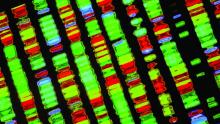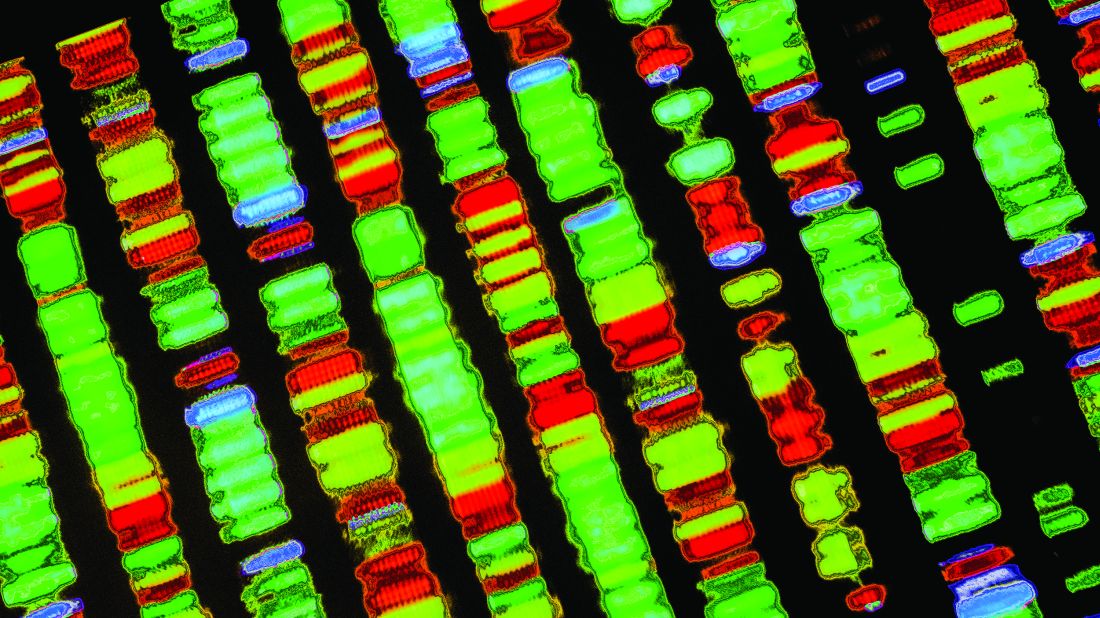User login
About 10% of patients with colorectal cancer had at least one germline mutation known to increase the risk of cancer, according to results from a large single-center retrospective cohort study published in Journal of Clinical Oncology.
The findings “raise the provocative question of whether all patients with colorectal cancer (CRC) should undergo multigene germline testing for inherited cancer susceptibility,” especially because the results have implications for both patients and family members, said Matthew B. Yurgelun, MD, of Dana-Farber Cancer Institute in Boston, and his associates.
Hereditary factors long have been known to play a role in CRC, but clinicians have routinely limited genetic testing to phenotypically high-risk patients and to specific syndromes. For example, all patients with CRC are now typically tested for microsatellite instability (MSI) and mismatch repair deficiency (MRD) to identify the 2%-4% with Lynch syndrome. Likewise, patients with colorectal polyposis are routinely tested for familial adenomatous polyposis (FAP) and MUTYH-associated polyposis (MAP), the researchers noted.
To explore the prevalence of germline mutations among unselected patients with CRC, they studied 1,058 consecutive cases treated at Dana-Farber Institute between December 2008 and March 2014. The researchers tested blood samples for 25 genes linked to inherited cancer risk, reviewed medical records, and sifted through questionnaires to assess personal and family cancer histories, tumor locations, and the results of tests for MSI, MMR, and KRAS/NRAS and BRAF mutations. They also categorized each gene as high or moderate penetrance based on published estimates of the lifetime risk of cancer associated with pathogenic mutations of that gene.
Pathogenic germline mutations were found in 105 patients (9.9%; 95% confidence interval, 8.2%-11.9%). Lynch syndrome was the most common single mutational genotype, affecting 33 patients (3.1%). Twenty-eight of 29 (97%) MSI/MMR tests were abnormal, confirming the reliability of MSI/MMR testing for diagnosing Lynch syndrome, the researchers noted
Among 74 (7%) patients with mutations besides Lynch syndrome, 23 (2%) patients had mutations in high-penetrance genes, including 11 (1%) with BRCA1/2 mutations, five with APC, three with biallelic MUTYH, two with PALB2, one with CDKN2A, and one with TP53.
Notably, 15 of these patients had no clinical history that would have suggested an underlying mutation, the researchers noted. Another 38 (3.6%) patients had moderate-penetrance CRC risk gene mutations, including 19 patients with monoallelic MUTYH, 17 patients with APC*I1307K, and two patients with CHEK2 mutations, they said.
Additional analysis failed to link pathogenic mutations to age at CRC diagnosis, family history of CRC, or personal history of other cancers. Thus, clinicians should not skip comprehensive germline testing in CRC just because patients lack these characteristics, the researchers said. Indeed, the findings “clearly illustrate that genetic factors that underlie CRC extend beyond [the] well-recognized familial CRC syndromes, are markedly more common than previously appreciated, frequently occur in patients with CRC who lack classic high-risk features, and are found predominantly in genes for which specialized risk-reducing interventions are recommended,” they emphasized.
The National Cancer Institute and Myriad Genetics supported the work. Dr. Yurgelun disclosed research funding from Myriad Genetics.
About 10% of patients with colorectal cancer had at least one germline mutation known to increase the risk of cancer, according to results from a large single-center retrospective cohort study published in Journal of Clinical Oncology.
The findings “raise the provocative question of whether all patients with colorectal cancer (CRC) should undergo multigene germline testing for inherited cancer susceptibility,” especially because the results have implications for both patients and family members, said Matthew B. Yurgelun, MD, of Dana-Farber Cancer Institute in Boston, and his associates.
Hereditary factors long have been known to play a role in CRC, but clinicians have routinely limited genetic testing to phenotypically high-risk patients and to specific syndromes. For example, all patients with CRC are now typically tested for microsatellite instability (MSI) and mismatch repair deficiency (MRD) to identify the 2%-4% with Lynch syndrome. Likewise, patients with colorectal polyposis are routinely tested for familial adenomatous polyposis (FAP) and MUTYH-associated polyposis (MAP), the researchers noted.
To explore the prevalence of germline mutations among unselected patients with CRC, they studied 1,058 consecutive cases treated at Dana-Farber Institute between December 2008 and March 2014. The researchers tested blood samples for 25 genes linked to inherited cancer risk, reviewed medical records, and sifted through questionnaires to assess personal and family cancer histories, tumor locations, and the results of tests for MSI, MMR, and KRAS/NRAS and BRAF mutations. They also categorized each gene as high or moderate penetrance based on published estimates of the lifetime risk of cancer associated with pathogenic mutations of that gene.
Pathogenic germline mutations were found in 105 patients (9.9%; 95% confidence interval, 8.2%-11.9%). Lynch syndrome was the most common single mutational genotype, affecting 33 patients (3.1%). Twenty-eight of 29 (97%) MSI/MMR tests were abnormal, confirming the reliability of MSI/MMR testing for diagnosing Lynch syndrome, the researchers noted
Among 74 (7%) patients with mutations besides Lynch syndrome, 23 (2%) patients had mutations in high-penetrance genes, including 11 (1%) with BRCA1/2 mutations, five with APC, three with biallelic MUTYH, two with PALB2, one with CDKN2A, and one with TP53.
Notably, 15 of these patients had no clinical history that would have suggested an underlying mutation, the researchers noted. Another 38 (3.6%) patients had moderate-penetrance CRC risk gene mutations, including 19 patients with monoallelic MUTYH, 17 patients with APC*I1307K, and two patients with CHEK2 mutations, they said.
Additional analysis failed to link pathogenic mutations to age at CRC diagnosis, family history of CRC, or personal history of other cancers. Thus, clinicians should not skip comprehensive germline testing in CRC just because patients lack these characteristics, the researchers said. Indeed, the findings “clearly illustrate that genetic factors that underlie CRC extend beyond [the] well-recognized familial CRC syndromes, are markedly more common than previously appreciated, frequently occur in patients with CRC who lack classic high-risk features, and are found predominantly in genes for which specialized risk-reducing interventions are recommended,” they emphasized.
The National Cancer Institute and Myriad Genetics supported the work. Dr. Yurgelun disclosed research funding from Myriad Genetics.
About 10% of patients with colorectal cancer had at least one germline mutation known to increase the risk of cancer, according to results from a large single-center retrospective cohort study published in Journal of Clinical Oncology.
The findings “raise the provocative question of whether all patients with colorectal cancer (CRC) should undergo multigene germline testing for inherited cancer susceptibility,” especially because the results have implications for both patients and family members, said Matthew B. Yurgelun, MD, of Dana-Farber Cancer Institute in Boston, and his associates.
Hereditary factors long have been known to play a role in CRC, but clinicians have routinely limited genetic testing to phenotypically high-risk patients and to specific syndromes. For example, all patients with CRC are now typically tested for microsatellite instability (MSI) and mismatch repair deficiency (MRD) to identify the 2%-4% with Lynch syndrome. Likewise, patients with colorectal polyposis are routinely tested for familial adenomatous polyposis (FAP) and MUTYH-associated polyposis (MAP), the researchers noted.
To explore the prevalence of germline mutations among unselected patients with CRC, they studied 1,058 consecutive cases treated at Dana-Farber Institute between December 2008 and March 2014. The researchers tested blood samples for 25 genes linked to inherited cancer risk, reviewed medical records, and sifted through questionnaires to assess personal and family cancer histories, tumor locations, and the results of tests for MSI, MMR, and KRAS/NRAS and BRAF mutations. They also categorized each gene as high or moderate penetrance based on published estimates of the lifetime risk of cancer associated with pathogenic mutations of that gene.
Pathogenic germline mutations were found in 105 patients (9.9%; 95% confidence interval, 8.2%-11.9%). Lynch syndrome was the most common single mutational genotype, affecting 33 patients (3.1%). Twenty-eight of 29 (97%) MSI/MMR tests were abnormal, confirming the reliability of MSI/MMR testing for diagnosing Lynch syndrome, the researchers noted
Among 74 (7%) patients with mutations besides Lynch syndrome, 23 (2%) patients had mutations in high-penetrance genes, including 11 (1%) with BRCA1/2 mutations, five with APC, three with biallelic MUTYH, two with PALB2, one with CDKN2A, and one with TP53.
Notably, 15 of these patients had no clinical history that would have suggested an underlying mutation, the researchers noted. Another 38 (3.6%) patients had moderate-penetrance CRC risk gene mutations, including 19 patients with monoallelic MUTYH, 17 patients with APC*I1307K, and two patients with CHEK2 mutations, they said.
Additional analysis failed to link pathogenic mutations to age at CRC diagnosis, family history of CRC, or personal history of other cancers. Thus, clinicians should not skip comprehensive germline testing in CRC just because patients lack these characteristics, the researchers said. Indeed, the findings “clearly illustrate that genetic factors that underlie CRC extend beyond [the] well-recognized familial CRC syndromes, are markedly more common than previously appreciated, frequently occur in patients with CRC who lack classic high-risk features, and are found predominantly in genes for which specialized risk-reducing interventions are recommended,” they emphasized.
The National Cancer Institute and Myriad Genetics supported the work. Dr. Yurgelun disclosed research funding from Myriad Genetics.
FROM THE JOURNAL OF CLINICAL ONCOLOGY
Key clinical point: Consider comprehensive germline testing in all patients with colorectal cancer.
Major finding: A total of 9.9% of patients had pathogenic germline mutations.
Data source: A single-center retrospective cohort study of 1,058 unselected patients with colorectal cancer.
Disclosures: The National Cancer Institute and Myriad Genetics supported the work. Dr. Yurgelun disclosed research funding from Myriad Genetics.

